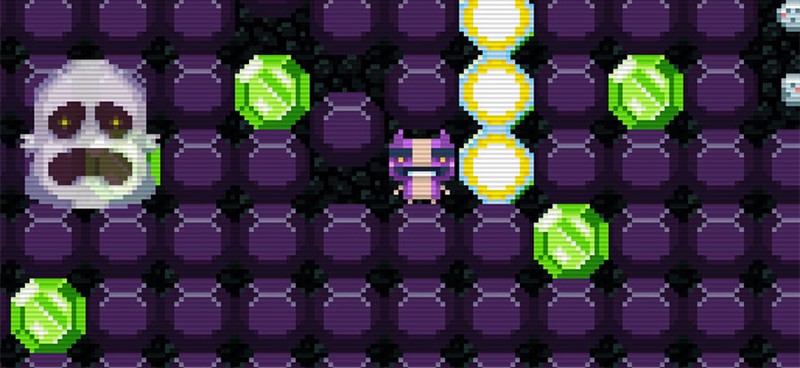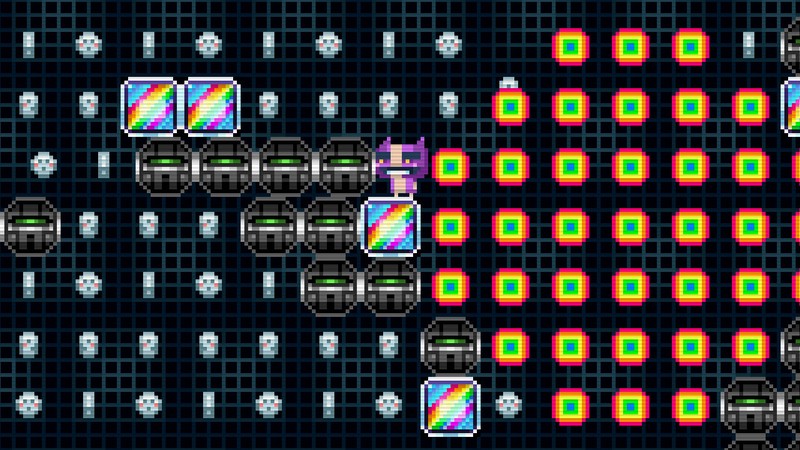
Pushcat is a vintage inspired match three and puzzler combo that would look at home on an Amiga 500 or Master System. Collecting coins and head scratching are the order of the day in this surprisingly adept $4.99 title.
Fun Challenges
That minor criticism out of the way, let's get into the premise of Pushcat. The aim is to manoeuvre blocks around the levels, matching three or more gems of the same colour, which will then explode and leave silver coins in their place. Collecting enough of these coins will win the level, and on some levels, collecting an extra few will award you with a precious star, several of which you will need in order to unlock the final stage of each of the five worlds.

It's a simple idea, but when that quickly becomes more complicated as progress is made. In some levels, there's squares of dirt that disappear once Pushcat walks into them, allowing blocks to fall from above or move into place. There needs to be a gap you can walk into before you can move something, and you can't push blocks upward.
Later levels unlock a variety of new block types and scenarios, including ones that replenish gems continuously, and rainbow gems that will explode and detonate other blocks around them.
Let Down by Random Generation
One of Pushcat's biggest flaws comes in its reliance on procedural generated levels. You'll soon spot which of these levels do not have a fixed structure, as restarting will reveal a different pattern and layout. The problems arise from the nature of that random generation, and how it impacts the experience of the level each time it is restarted. Sometimes, it can make a level next to impossible, while others incredibly easy.
What this does, sadly, is take away from your sense of achievement - you're never quite sure if you've just managed to beat a level on the fifth attempt because you've improved, or because the game just gave you an easier version of it.
I understand why it was done - procedurally generated content is very much in vogue at the moment, and it allows the developers to spend less time on designing each level individually and more time on other facets of the game, but it's a shame to see the negative effect that it has in this instance. Perhaps less levels but more handcrafted designs would have benefited the game.
More Thinking Required
What's great about Pushcat is that there's so much more challenge than the first couple of levels would suggest. Even the smallest of design decisions add layers to it - the fact that the coins will support and restrict the movement of blocks until they're collected - or that gems will match as they're falling rather than only when they're settled.
By the time the entire sum of the game's quirks and mechanics have been combined into an advanced level, the thinking required to progress can at times be wonderfully uncharacteristic of a match three game.
There have been several times where I've attempted one of the handcrafted levels only to find that I was missing a simple solution - and that's entirely because other levels dissuade the player from looking for the obvious and force them to take a convoluted route to success.
There's flexibility built into the game, too. There are enough levels that award stars to complete to have some spare if you finish them all - which means for people who struggle with some of the more teasing stages can skip them and try their fortune elsewhere - they may not even need to go back in order to get into the next world.
Zut Games have done a decent job of varying the type of levels up as well - there are the complex brain teasers discussed earlier, walls of gems that resemble more traditional match three gameplay - even if they do become a bit tedious if the coin requirement is high - and hybrid levels which can be either of the two with some added emphasis on digging, presenting a different type of challenge.
It's wonderful to see a game in this price range that can not only find the balance between easy and hard content without a straight linear progression from one to the other, but also one that can present different kinds of challenges, too.
To Push or not to Push?
Pushcat is a pleasing surprise that brought me back to my childhood, reminding me of time spent with Bubble Bobble and Clogger. My displeasure at certain levels is not enough to put me off my attempt to complete the game, and I doubt these minor missteps in design will be for you, either. It's just a shame that the feline theme doesn't shine through more.
Comments